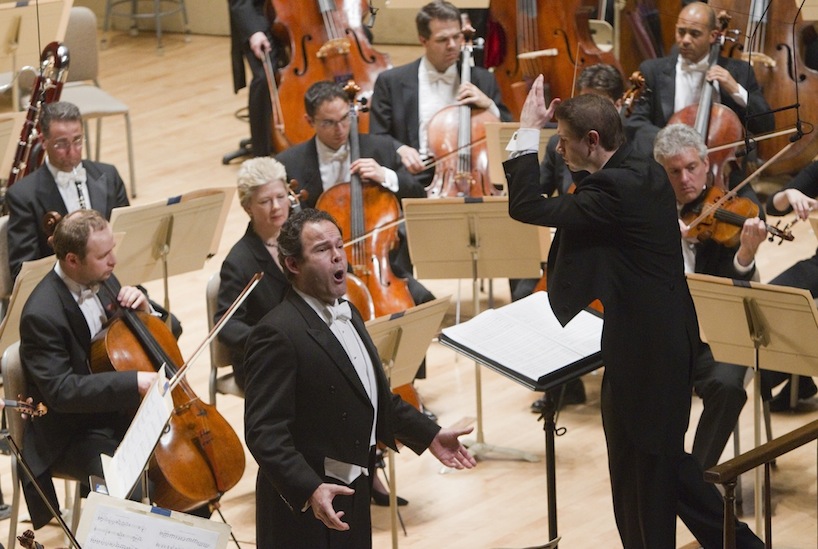Lieberson’s new song cycle given a moving premiere by Finley, Boston Symphony

Gerald Finley performs in the world premiere of Peter Lieberson's "Songs of Love and Sorrow" Thursday night with the Boston Symphony Orchestra and conductor Jayce Ogren. Photo: Michael J. Lutch
Everyone hates long good-byes. But in the case of Peter Lieberson’s Songs of Love and Sorrow, his second series of farewell compositions for his late wife Lorraine Hunt Lieberson, few would would have it any other way.
The cycle of five songs set from Pablo Neruda’s Love Sonnets was premiered by the Boston Symphony Orchestra Thursday evening at Symphony Hall with conductor Jayce Ogren, filling in for the ailing James Levine.
Written for baritone—the estimable Gerald Finley—and orchestra, it complements the composer’s previous cycle, Neruda Songs, which Hunt Lieberson performed on the same stage just before her death in 2006.
Songs of Love and Sorrow had a long and difficult gestation. The Neruda Songs, winner of a Grammy and the Grawemeyer Prize, proved such a success that James Levine, who conducted the Boston premiere, immediately asked for a follow-up cycle. At the time, Lieberson, emotionally drained, hesitated to take the commission. And before he could fulfill the request, more bittersweet happiness and sorrow intervened.
Not long after Hunt Lieberson died, Peter Lieberson fell seriously ill with lymphoma, and stopped composing completely while undergoing vigorous treatment including massive stem cell transfusions. As time passed, his health returned, and Lieberson—whose cancer is in remission and has since remarried—returned to his follow-up cycle, intent not only on making a final artistic farewell to Lorraine, but incorporating all that life has brought him since she passed away.
The five settings range from wistful to erotic to celebratory, following the lead of Neruda’s texts. The first, Des las estrellas, has an expansive orchestral overture, introducing themes and motives that recur throughout the cycle. The second, Plena mujer, the most erotic of the set, brings out Finley’s instrument at its lyric best.
The centerpiece, Cantas, with its falling two-chord refrain, takes the most liberties with the original words, and also creates the most energy in the orchestra, with substantial solo passages for flute and cello. Tal vez no ser moves to a dramatic, minor key, but Lieberson, perhaps unwilling to end on a downward arc, concludes triumphantly with Amor mio, its repeated farewell refrain of “Adios” voiced lovingly, not wistfully.
Gerald Finley’s naturally produced baritone filled the room with ease, and the Canadian singer proved a sensitive interpreter of these texts, having clearly internalized the range of emotions in Lieberson’s music.
The immediate success of Songs of Love and Sorrow lies in its direct emotional impact, its evocations, its backstory. The Boston audience, with fond memories of Hunt Lieberson and her many local performances, were quick to embrace the work, treating it like an old friend.
But the cycle’s future success is also assured, resting on the unity and musical integrity of the work. Songs of Love and Sorrow is a remarkable collaboration between symphony and singer, not simply five attractive individual song settings. Ogren, the Cleveland Orchestra’s former assistant conductor, made his BSO debut on short notice, handling the score, the singer, and the orchestra with alert sensitivity.
With the Lieberson premiere clearly receiving most of the rehearsal time, there were parts of the program that the young conductor probably would like to do over. The evening began well enough with smart readings of Sibelius’ Finlandia and Valse triste, but the concluding work, Schubert’s Great Symphony in C major, came unhinged, with the BSO’s usually trusty horn section having trouble holding together, creating a disjoint Ives-like melee. But on the whole, with short notice and a major world premiere to focus on, Ogren for the most part demonstrated that he is a conductor with a clear idea of what he wanted and the skills to be able to get it.
The program will be repeated 1:30 p.m. Friday, 8 p.m. Saturday and 8 p.m. Tuesday. www.bso.org; 866-266-1200.
Keith Powers covers classical music for the Boston Herald and the New Bedford Standard-Times, and contributes program and liner notes to a number of presenters and recording artists.